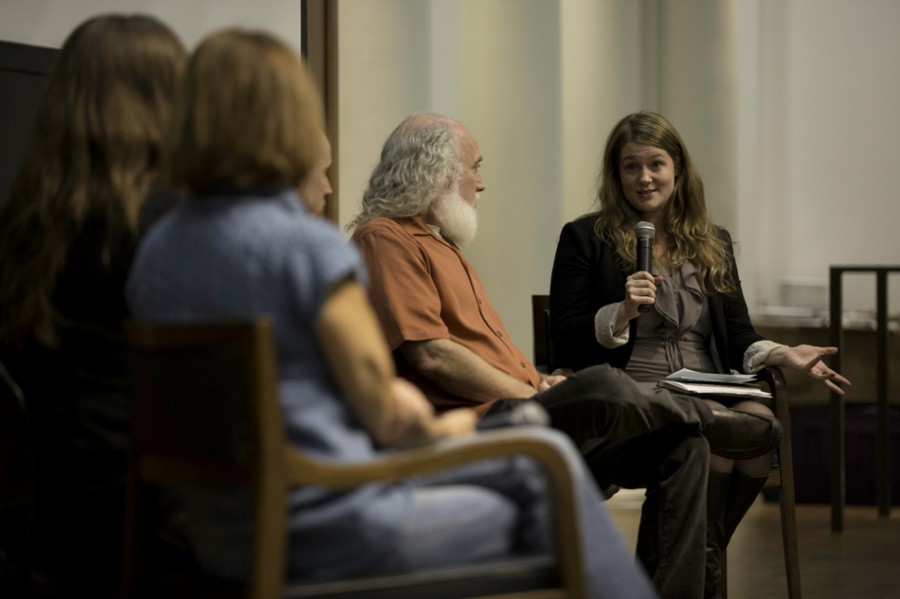Local chefs, restaurant owners talk sustainability
Adnaan Zaffer/The Daily Northwestern
Eloise Karlatiras, president and CEO of the Green Chicago Restaurant Coalition, moderates a discussion in Harris Hall on Wednesday night. As part of NU Sustainable Food Talks, panelists talked about the challenges restaurants face in going “green.”
October 23, 2014
Local chefs and restaurant owners discussed Wednesday night going “green” in the restaurant business at a panel discussion as a part of NU Sustainable Food Talks.
Panelists, who spoke in Harris Hall, said their restaurants have taken strides in recycling, composting, using compostable products and increasing energy efficiency. The panelists talked about the challenges and the rewards of increasing sustainability efforts in their businesses.
Heidi Moorman Coudal, owner of Big Delicious Planet Catering and Canteen, said the company will have grown at least 5,000 pounds of vegetables by the end of this year. Big Delicious, named the “Greenest Caterer in America” by the Green Restaurant Association, operates in a geothermal building and grows its own vegetables on its own urban farm.
Panelists also discussed their backgrounds in the sustainability movement, labels often associated with the “green” movement and how social justice plays a role in going “green.”
“I was kind of an accidental sustain-abilist,” said chef Zak Dolezal of Duke’s Alehouse and Kitchen. “It was a passion for delicious food that began it all.”
Dolezal said he would frequent local farmers’ markets in Crystal Lake, Illinois, where the restaurant is based, and search for the locally sourced produce he needed.
But farmers’ markets often didn’t produce vegetables in the kind of bulk Dolezal required for his restaurant. He had to take steps — “make promises and handshakes,” he said — to get the produce he needed.
“Now, farmers are approaching us,” Dolezal said.
But even though the restaurants on the panel are known as sustainable or “green” restaurants, panelists said they believe the term “green” and other sustainable food labels have become meaningless because of advertising and overuse of the terms.
“Farm-to-table,” said Found Kitchen and Social House owner Amy Morton. “What does that even mean anymore?”
Nonetheless, Found, 1631 Chicago Ave., would fall under that label, she said. Its locally sourced food literally goes from the farm to the table, Morton said, but she added that she would never call it farm-to-table because of the overuse of the term.
“I’m concerned that ‘green’ has become too commercialized,” said David Lipschutz, owner of Blind Faith Cafe, 525 Dempster St.
The certification isn’t as important as who the food is from, Morton said. Found will take its employees on field trips to local farms to see how farmers raise their crops or livestock.
“There is a cost to the way crops and animals are managed in this country,” Lipschutz said, referring to the way pesticides are sprayed in common agricultural practices and may travel through food and endanger humans. “We have to remember that we’re in a system larger than ourselves.”
Education of the public is key, Lipschutz said.
“As our guests become more educated, they hold us to a higher standard,” he added.
Eloise Karlatiras, the president and CEO of the Green Chicago Restaurant Coalition, moderated the discussion.



